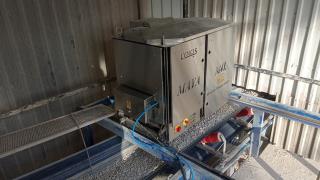Märker Zement GmbH has opted for the use of alternative fuels at its cement plant in Harburg, Germany, with the aim of enhancing both cost efficiency and sustainability efforts. To convey and store the various alternative materials, the cement producer commissioned a special single-source solution from the BEUMER Group, the centrepiece of which is a 700m-long pipe conveyor. By BEUMER Group, Germany.
How can cement plants reduce their greenhouse gas emissions while also lowering production costs on a sustainable basis? That was the question faced by Märker Zement, based in Harburg Germany. The task was to set up a new kiln line, which should be fired by alternative fuel up to the level of 100 percent substitution of conventional fuels.
At its cement plant in Harburg, Märker uses refuse-derived fuel (RDF) instead of coal and gas to fire its kiln line. The fuel arrives in two different qualities which differ in grain size and calorific value. In addition, the plant uses shredded tyres as tyre-derived fuel (TDF). To reliably handle these materials at a maximum capacity of 40tph, the company turned to the beumer Group for a special single-source solution.
End-to-end AF handling
BEUMER’s AFR Systems division specifically caters for cement producers looking to implement alternative fuels (AFs) and alternative raw material (ARMs) handling solutions. “Our know-how and tailor-made systems permit us to offer optimum support to our customers,” says Jan Tuma, chief sales officer of the BEUMER Group in the Czech Republic. “We have years of experience in this area and always take our customers’ needs into account.”
BEUMER is able to supply and install the entire AF and AFR materials handling chain: from receiving and unloading delivery vehicles, to storage, conveying and feeding of the solid fuels in accordance with user requirements. This can include fully-automatic systems for separating and handling tyres of different weights and sizes and conveying them to the kiln inlet.
With BEUMER’s solution, customers receive everything from a single source, thus requiring only one point of contact. “In this project we took care of the mechanical installation and electrical installation, followed by commissioning,” notes Mr Tuma.
Project overview
Key elements of the project include an intermediate storage facility and a 700m-long pipe conveyor connected to the plant’s warehouse. There is also a connection to a new preheater and to the existing warehouse for the main burner. Other newly-installed equipment in and around the warehouse includes a fully-automatic overhead crane, buffer bins, magnetic separators, a screen and the feeding station for the pipe conveyor.
The intermediate storage facility is provided with silos, distribution equipment and a screen. In addition, a BG OptiFeed weighing screw conveyor has also been installed. The weigh-feeder suitable for different types of materials, making the system ideal for continuous feeding. Since the screw conveyor is positioned on the weighing cells, operators can see how much material is being delivered. It feeds material to downstream conveyor parts at a rate of up to 15tph. The system is completely enclosed to prevent the release of dust.
The screw conveyor moves bulk material in a measured way to the pneumatic transport system, which supplies the preheater with control fuel. The mechanical transport system for the main fuel to the preheater consists of a belt conveyor and bucket elevator. An additional pipe conveyor connects the intermediate storage facility with the storage unit at the main burner.
An additional part of the supply included an emergency feeding line next to the intermediate storage facility for the fast unloading of trucks into silos if required. This line consists of a BG OptiBulk, a screw conveyor and an additional bucket elevator. The BG OptiBulk unloading station has a special enclosure to prevent the release of dust and protect the material from the environment. BEUMER has also installed filters at all important transfer stations.
Pipe conveyor at the heart
The pipe conveyor lies at the heart of the system. In the pipe conveyor, idler rollers shape the belt into a closed tube. This safeguards the material being transported from external influences and also protects the environment from materials and dust that may escape. This solution also ensures low noise emissions to the surroundings. Supporting plates with hexagonal cut-outs and idler rollers in an offset arrangement keep the tube closed.
Pipe conveyors are able to cope with tighter curves and greater angles of inclination compared to open-troughed belt conveyors.
Due to its ability to navigate curves, this belt conveyor requires a lot less or no transfer towers at all, depending on its length and the available curve radii. This results in substantial cost savings for the customer, and allows BEUMER Group to easily customise the system to the individual routing. Durable conveyor belts guaranteeing tensile strength are used. The engineers use different dimensioning programs to determine the ideal conveyor design. They use them to calculate tractive forces and forces that arise during acceleration and deceleration and also to determine possible curve radii. BEUMER Group provides tailor-made feasibility studies for each project. Another advantage is the reduced noise emission that the system provides. This is ensured by special idlers, as well as low-noise bearings and selecting the right conveying speed.
Continuous supply of fuel
Märker Zement is highly satisfied with its integrated AF handling system. The conveyors and associated equipment in the entire complex system ensure the continuous supply of fuel. Through this project, BEUMER has once again demonstrated its broad-ranging expertise in handling alternative fuels for the cement industry and its ability to provide manufacturers with efficient support.
This article was first published in the March 2023 issue of International Cement Review.
